|
|
|
Sort Order |
|
|
|
Items / Page
|
|
|
|
|
|
|
| Srl | Item |
| 1 |
ID:
135467


|
|
|
|
|
| Summary/Abstract |
The UPA government had a broad approach to India’s emergence as a regional and global power but has never articulated it in terms of a strategy. In essence, it is to delay some of the instruments of power projection while India achieves economic development and growth with balance, in an effort to uplift all the Indian people. The focus of this policy is on the welfare of the people and consequent benefits of political consolidation, while not unduly constraining the reforms and growth needed to pay for them. Prominent risks to the strategy include the interlocking problems of security and governance.
|
|
|
|
|
|
|
|
|
|
|
|
|
|
|
|
| 2 |
ID:
135468
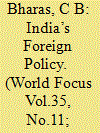

|
|
|
|
|
| Summary/Abstract |
Thus, it is clear that “With the gradual accretion of power by states such as China and India, the world may now be witnessing a major shift in power dynamics.” The Sino-Indian security relations shall have a tremendous impact on future and over all stability of Asia. When the security system of a state shall be at stake, when internal disturbance shall be cause of concern and in an environment of international terrorism, a security-centric national policy will of course, be given priority.
|
|
|
|
|
|
|
|
|
|
|
|
|
|
|
|
| 3 |
ID:
135810
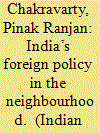

|
|
|
|
|
| Summary/Abstract |
India’s foreign policy started attracting renewed global attention since the beginning of the economic reform in 1991. With high rates of economic growth during the last two decades-almost 7.5 per cent on the average, through down to sub 5 per cent in last two years-India’s global trade today contributes over 50 per cent of its GDP, as compared about 3 per cent before. In PPP terms, India is the world’s third largest economy after the USA and China. India’s growing profile on the international stage has naturally led to question about the role India seeks to play, or should play, regionally and internationally. Clearly, the world expects India to play a larger role, commensurate with its size and growing power. Consequently, the question has arisen about India’s own perception and assessment of its international role, and the nature of its global engagement. This process has led to a changing consensus and nuancing of India’s foreign policy thinking and objectives.
|
|
|
|
|
|
|
|
|
|
|
|
|
|
|
|
| 4 |
ID:
135472
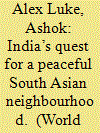

|
|
|
|
|
| Summary/Abstract |
India’s neighbourhood today is much better than what it was a few years ago, with the Taliban being restricted to certain locations in Afghanistan, Pakistan transforming itself completing the first full term civilian government in its history, Nepal being resurrected from the clutches Maoist insurgency and paving way to democracy, a pro India leader back in power in Bangladesh, a newly elected leader in Maldives with some positive gestures to India and a normal life returning to Sri Lanka after 3 decades of bloody civil war.
|
|
|
|
|
|
|
|
|
|
|
|
|
|
|
|
| 5 |
ID:
135473
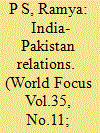

|
|
|
|
|
| Summary/Abstract |
A major part of history of the South Asian region has revolved around the complex and dynamic relations between India and Pakistan. A cursory glance at the trends in the bilateral ties between the nuclear weapon states depicts more downs than ups and a high level of mistrust. The bilateral relations have been characterised by ‘one step forward and two steps back’ phenomena leading to much cynicism over possible cooperation between the neighbours.
|
|
|
|
|
|
|
|
|
|
|
|
|
|
|
|
| 6 |
ID:
135488


|
|
|
|
|
| Summary/Abstract |
One of the hallmarks of Indian foreign policy in recent years has been enhancing energy security goals for the country through diplomatic efforts. The UPA Government’s foreign policy through 2004-2014, to a very large extent, remained intertwined with economic policies of the country for ensuring constant energy supplies in a changing international security scenario. India’s future energy consumption is expected to be driven by its economic growth and demographic trends.
|
|
|
|
|
|
|
|
|
|
|
|
|
|
|
|
| 7 |
ID:
135453


|
|
|
|
|
| Summary/Abstract |
Effectively predicting a Nation’s future requires a broad mind and an objective vision. It requires nuanced examination of various factors, a careful analysis of the gestures of the leader and the government, the language, the actions, the people, the perceptions et-al. While analyzing them, best effort has been put into finding an answer to a series of interesting questions beginning with the question- Why Prophecies on India have failed since and before India’s Independence. The article presents an objective analysis of the Prime-Ministership and allied factors shaping India’s diplomatic course and her future.
|
|
|
|
|
|
|
|
|
|
|
|
|
|
|
|
| 8 |
ID:
135450


|
|
|
|
|
| Summary/Abstract |
In the present world order marked with extreme complexity, contrariness, presence of strong counter-trend in every trend, India’s foreign policy must contend with but also make skilful use of the contradiction to moderate the rigours of hostile trends and challenges. To be so India must be able to “think anew and act anew and de-enthral herself from dogmatic thinking. In any case, to sum it all, the world has changed a lot and has been changing in the process so also Asia and India cannot pretend that she has not and she can no longer deny her responsibility to play a larger role in south Asia being the great power of the region.
|
|
|
|
|
|
|
|
|
|
|
|
|
|
|
|
| 9 |
ID:
135811
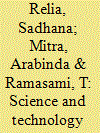

|
|
|
|
|
| Summary/Abstract |
In today’s inter-connected world, nation states develop their foreign policies to define their relationship with other countries, and for addressing all issues of international relevance. Foreign policy provides the broad framework that helps pursue a nation’s national interest in global affairs at the bilateral, regional, and multilateral levels. Thus, a nation state tries to negotiate and influence the behavior of other states through the instruments of its foreign policy. Importantly, today a nation’s foreign policy needs to position the self-interest of the country in the emerging global economy. Contrasting priorities and self-interests of different nation states become the basis for disagreements. Diplomacy is a powerful tool of great relevance when there is disagreement among nation states. Persuasion through dialogue and engagement is the major method used in international diplomacy. Diplomats are expected to display an extraordinary ability in the art of persuasion in order for them to become successful negotiators.
|
|
|
|
|
|
|
|
|
|
|
|
|
|
|
|
| 10 |
ID:
135445
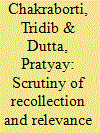

|
|
|
|
|
| Summary/Abstract |
Acharya Narendra Deva was one of the founder figures of the Socialist Movement in India and he believed in the extreme nationalism as propagated by Aurobindo and Bal Gangadhar Tilak. In the realm of foreign policy, he felt the need to establish Scientific Socialism for the solution of India’s problems and considered the working class as the vanguard, the peasants and the intelligentsia as the auxiliary of an anti-imperialist struggle.
|
|
|
|
|
|
|
|
|
|
|
|
|
|
|
|
|
|
|
|
|